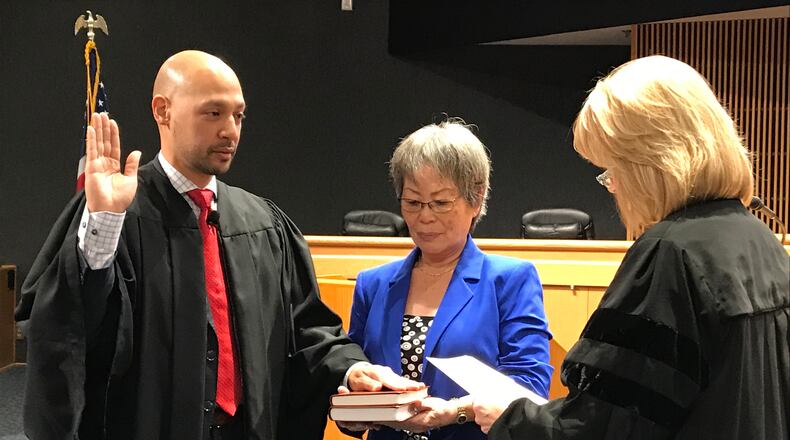Ramón Alvarado was an intern at the Legal Aid Society in New York when he tossed some money into the cup of a man standing on the sidewalk.
“What the hell?” the man responded.
The man hadn’t been begging — just standing outside with his coffee. Not only did he not need Alvarado’s cash, but the gesture rendered the coffee undrinkable.
“He was so generous,” Alvarado’s wife, Drew Dotson, recalled. “He would see opportunities to help that aren’t even there.”
Alvarado, who made history last year when he became the first Hispanic judge in Gwinnett County, died Monday from complications following a stem-cell transplant to treat the acute myeloid leukemia he had been battling for a year.
The 41-year-old of Korean and Puerto Rican descent served in Recorder’s Court, which handles code ordinances and traffic citations.
At his Jan. 7, 2019 swearing in, mentor Christine Koehler said she expected Alvarado to be promoted beyond that court.
“This is the very beginning for him,” she said that day.
In his speech, Alvarado said he had done the easy task of walking through the many doors that others opened for him — though Dotson said anyone who knew Alvarado knew how hard he worked.
“I promise to, when I’m sitting on the bench, use all of my life experiences to make the very best decisions,” Alvarado said.
Born in Panama to a military family, Alvarado worked as a public defender and a criminal defense attorney before ascending to the bench.
Ben Ku, a Gwinnett County commissioner who was sworn in just two weeks before Alvarado, said the new judge reached out to him as an “Asian hybrid” to say that Ku paved the way for him to serve.
At Alvarado’s swearing in, Ku said Alvarado was a “total nerd for superheros and a donut-eating champ” in addition to a capable lawyer and a groundbreaking judge.
“We are all so much more than our labels,” he said.
Dotson said there is no ceremony planned until a time when there can safely be a “food extravaganza.” Alvarado’s friends knew him as an eater, she said, and he told her years ago he would never want a funeral, but rather something so amazing “all the attendees would leave talking about how good the food was.”
Judge Katherine M. Armstrong, a colleague on the Recorder’s Court bench, said she is a better judge and better person because of Alvarado. His influence would be “everlasting,” she said.
And Gwinnett State Court Judge Emily Brantley, who was among those who appointed Alvarado to the bench, said as an attorney he always spoke the truth, even when it wasn’t in his favor.
Brantley also recalled an email she received from a friend whose son Alvarado represented as a lawyer. Not only did Alvarado help her son get into drug court, the woman wrote, but he stayed in touch with him through the program and his graduation, and continued to be in touch even as he was undergoing cancer treatments.
The woman’s son attributed his success to Alvarado, Brantley said.
She said appointing him to the bench was an easy decision.
“We knew he would be kind to the people, patient, treat them with respect and honor,” she said. “If we could all be like Ramón, this world would certainly be different.”
Dotson said her husband cared significantly about civil rights, equality, equal justice and animal rights. The couple has three dogs and when a fourth, a beagle named Phoenix, was in failing health, Alvarado slept on the couch downstairs for six months because he said Phoenix always seemed happiest by the fireplace and he didn’t want to leave her alone.
The couple also fostered dogs, and Dotson said she had to talk Alvarado out of keeping them all. Before his cancer diagnosis, the couple took a two-week RV trip to more than 10 states. They brought all three dogs, Dotson said, because they couldn’t bear to go on vacation without their pets.
“That was our favorite memory, being on that trip,” she said. “I just remember him being like, ‘Why can’t we live like this all the time?‘”
As a lawyer, Dotson said, Alvarado was invested in helping people turn their lives around. When the two got married, they raised $25,000 for the Cystic Fibrosis Foundation rather than have a traditional wedding registry. And when Alvarado was in the hospital, trying to do a lap around the floor, he noticed some nurses looking at a takeout menu and bought lunch for the entire staff — more than 20 people, Dotson said.
“He just was so kind and compassionate,” she said. “He just never ran out of gifts to give other people.”
About the Author
The Latest
Featured



